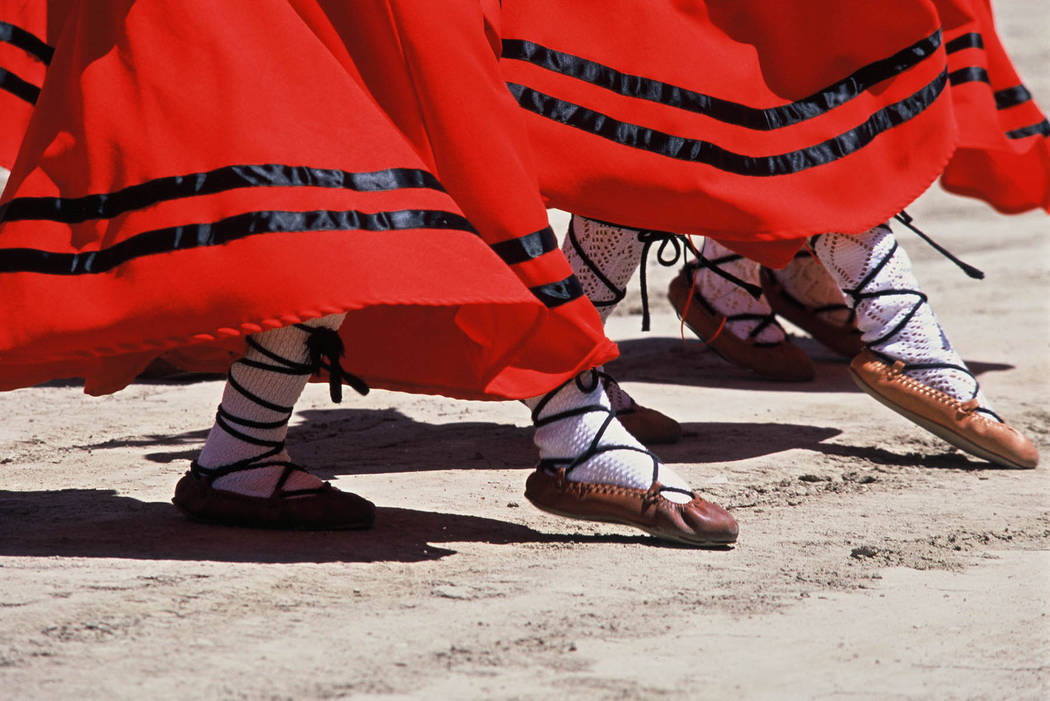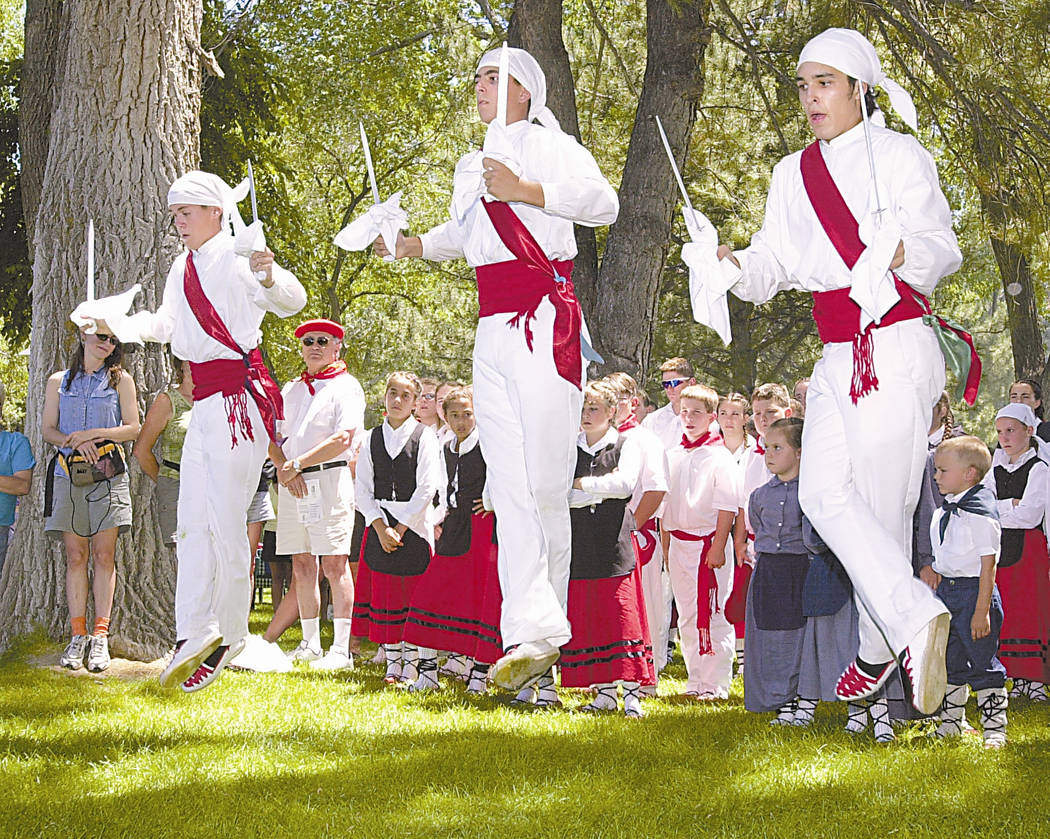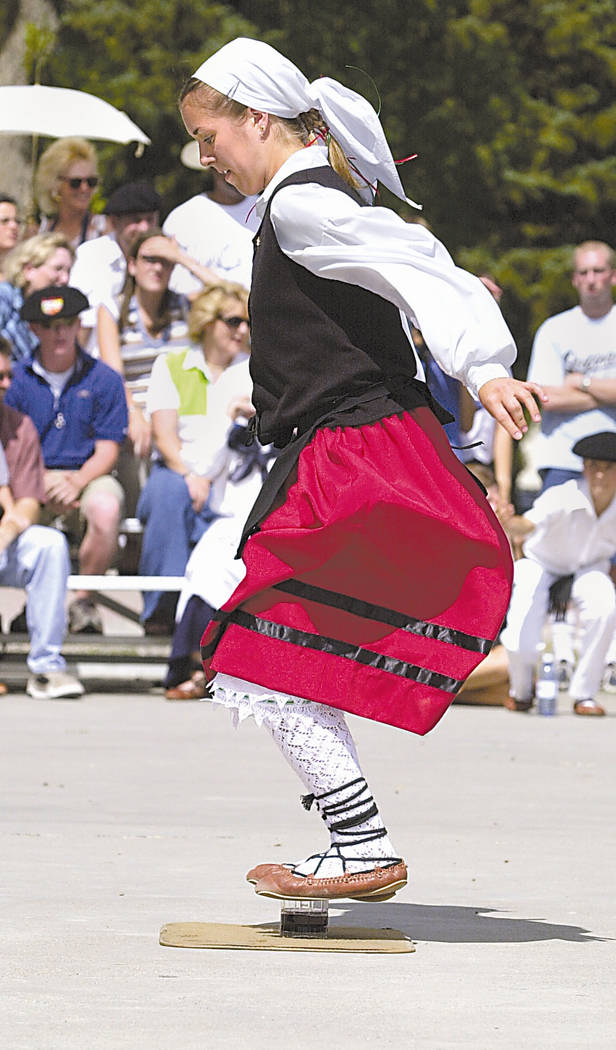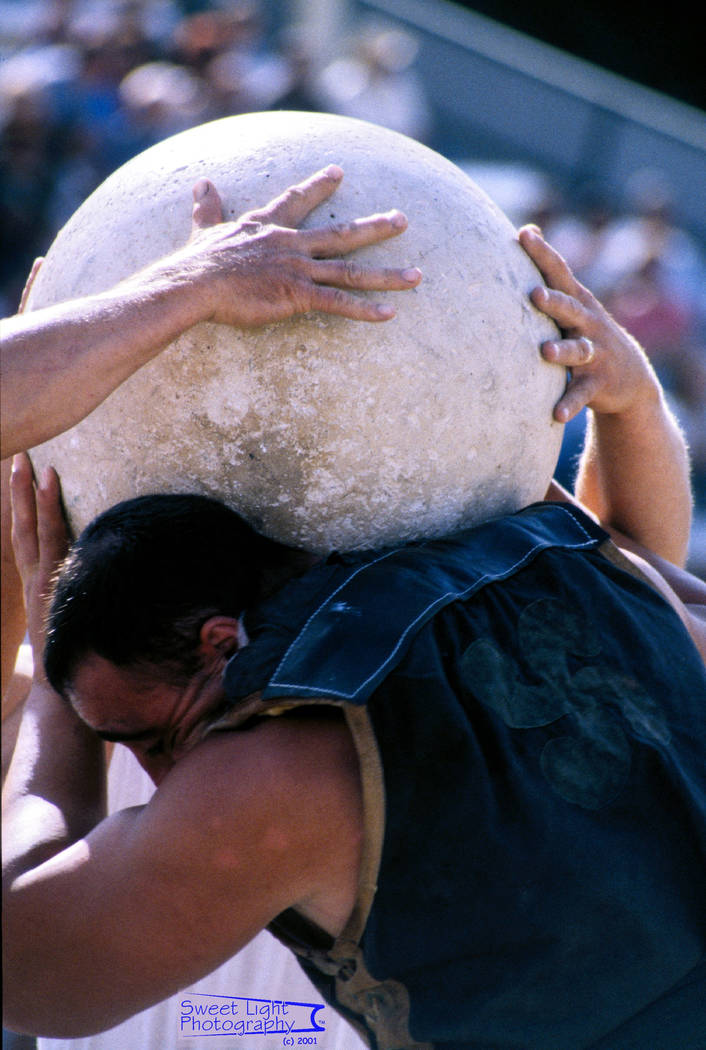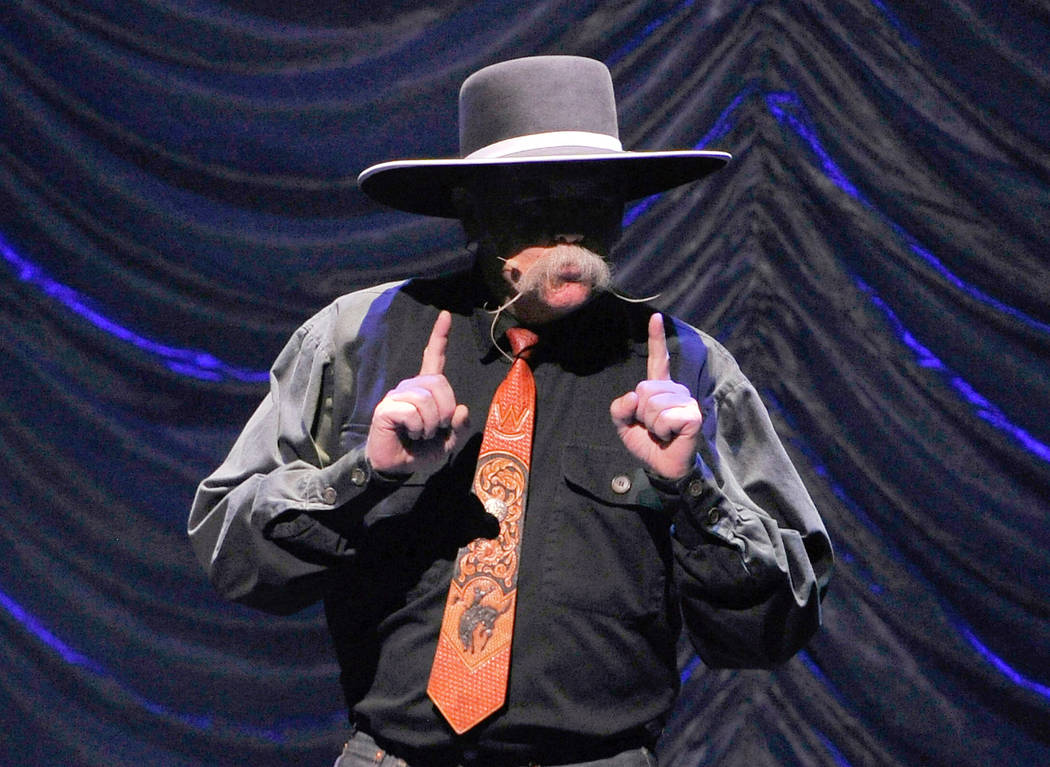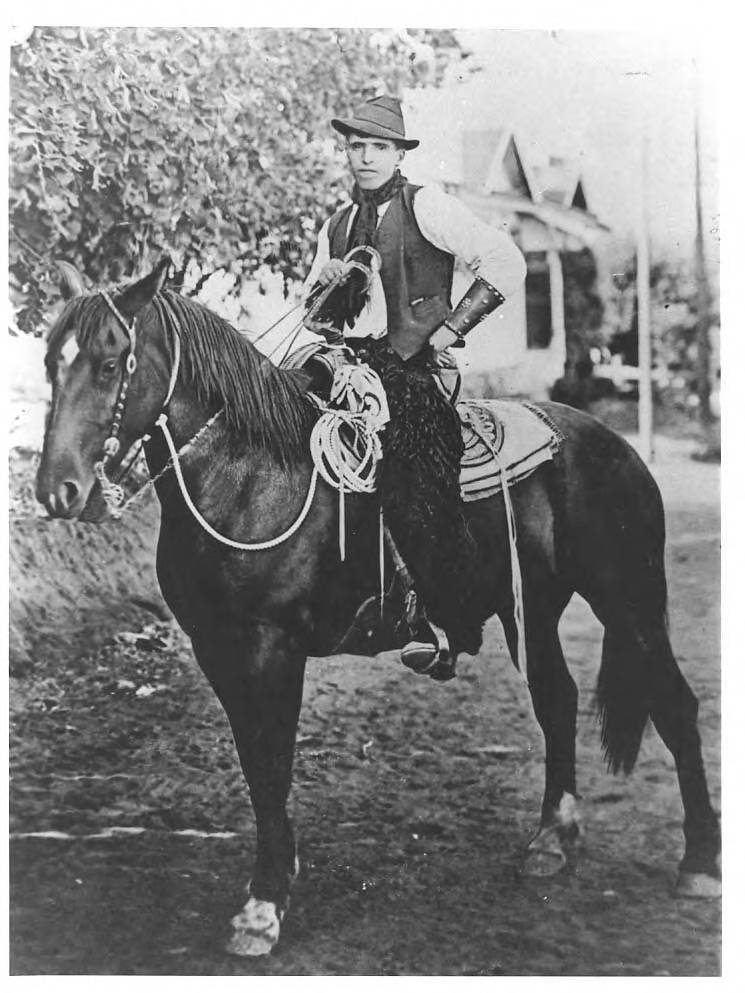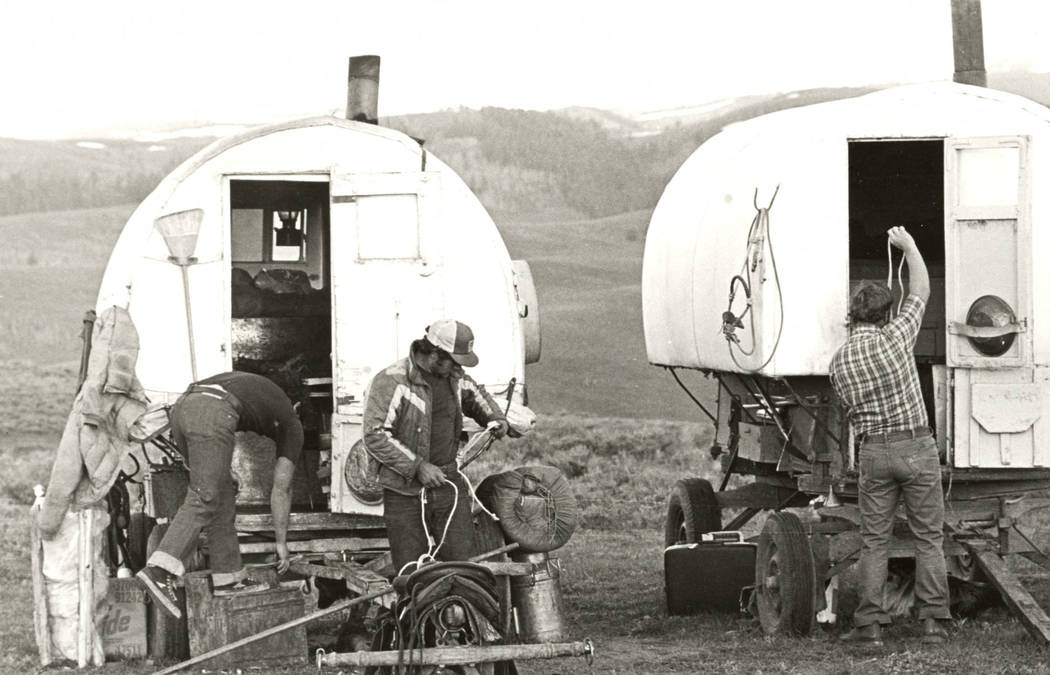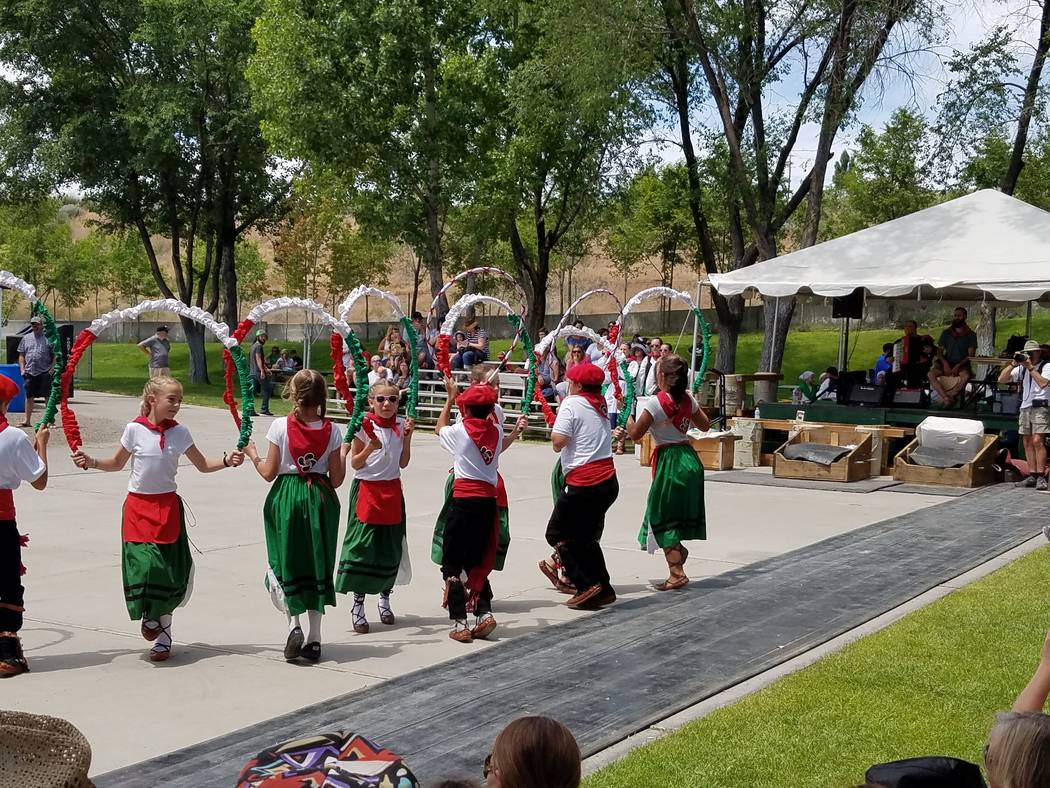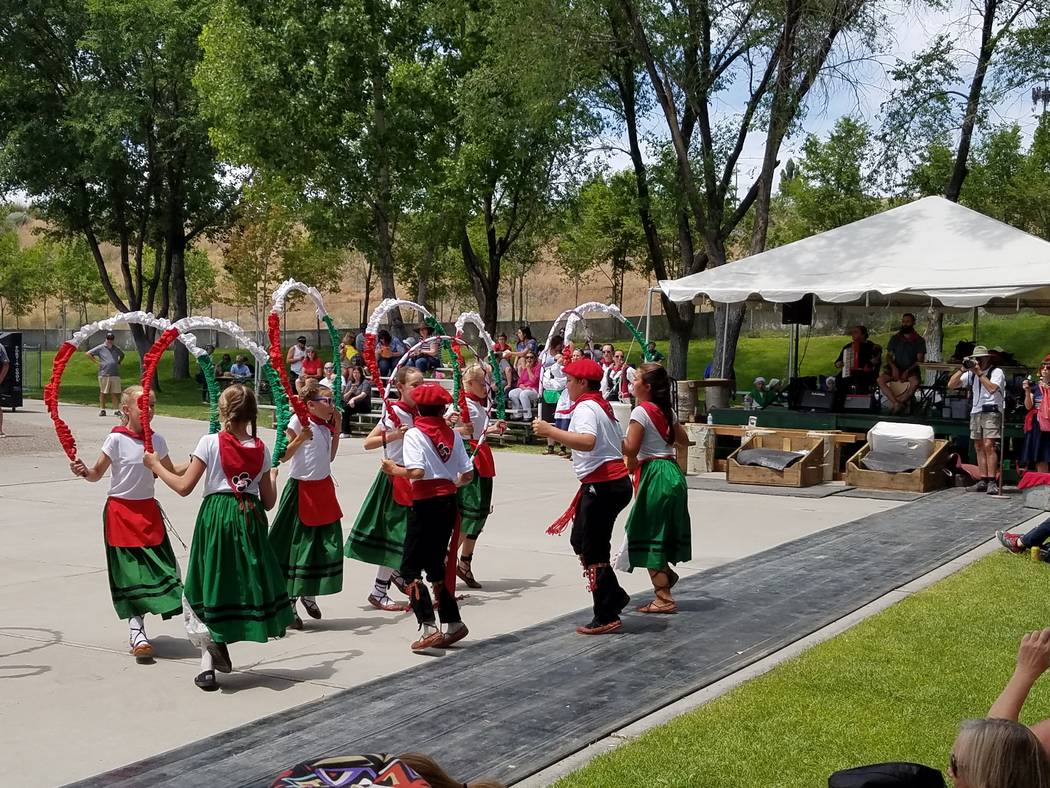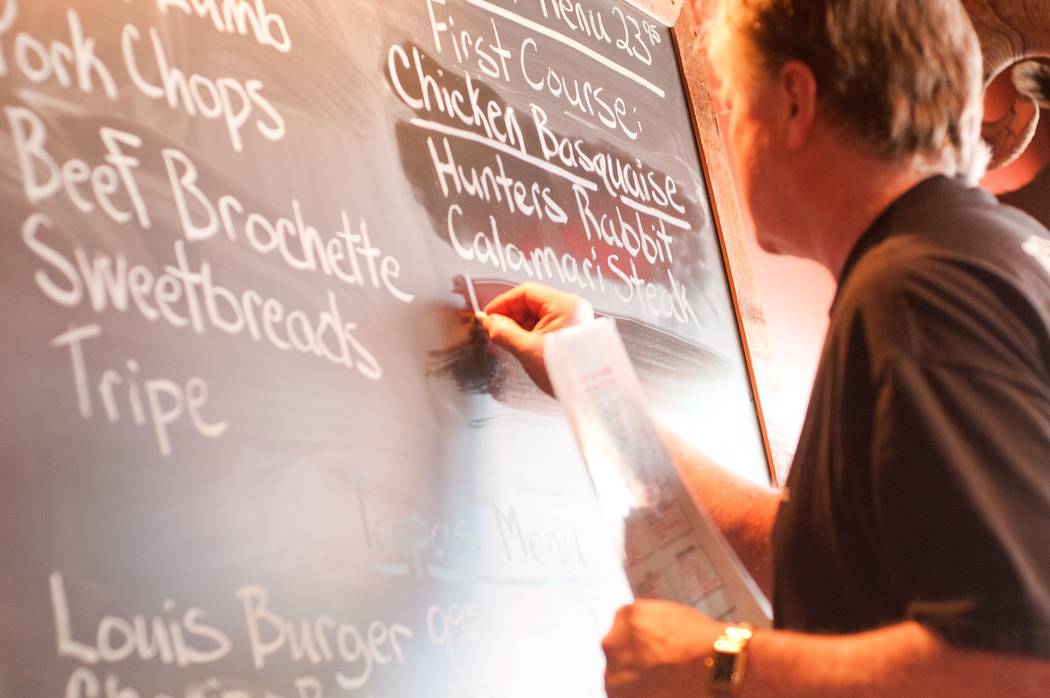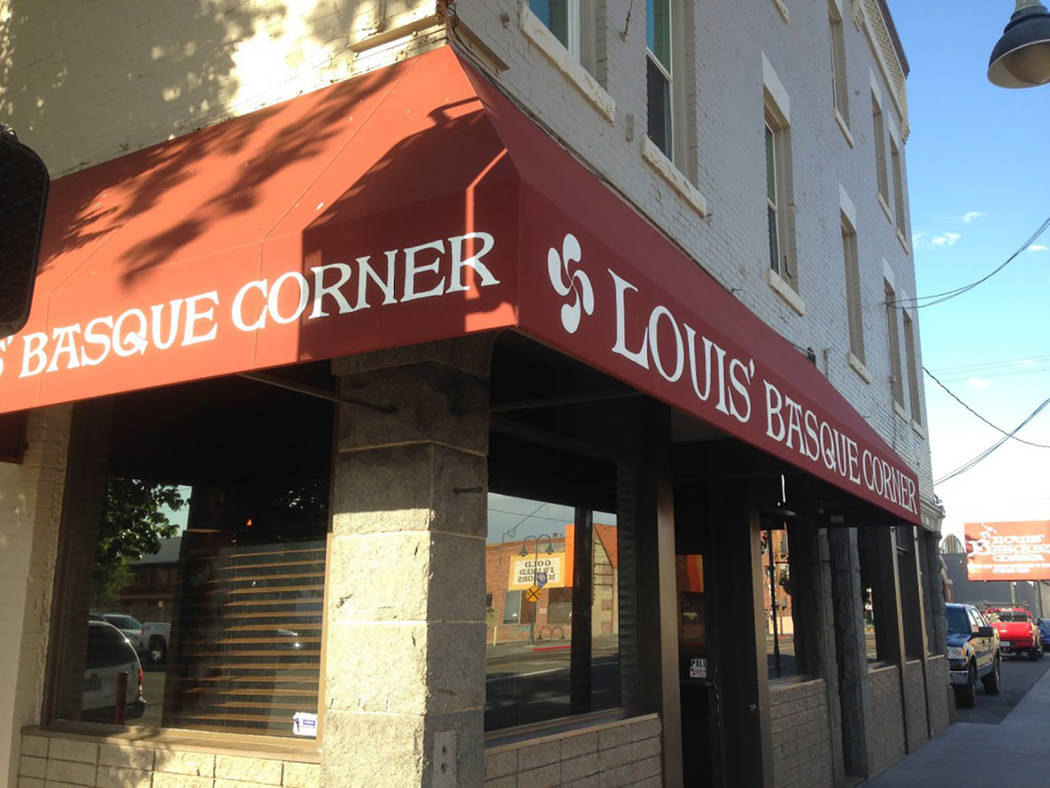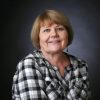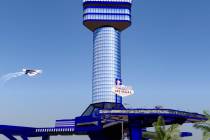Basque culture leaves its mark on Nevada
Their numbers may be small, but Basques and their descendants have left an indelible mark on Nevada — so much so that the theme of the 34th National Cowboy Poetry Gathering in Elko is “Basques & Buckaroos: Herding Cultures of Basin, Range and Beyond.”
“They really have played a huge role in the American West in ranching culture, in herding culture,” said Meg Glaser, artistic director of the Western Folklife Center, organizer of the six-day annual festival, which starts Monday. It’s a natural fit considering many Basques came to the West to work as sheepherders, just as they have for generations in the Basque country in the Pyrenees Mountains of southwestern Europe.
Today, about 5,390 Basques live in Nevada, mostly in the central and northern parts. The National Basque Festival is in Elko each year, and the National Monument to the Basque Sheepherder is in a Reno park.
Jose Beristain, president of the Lagun Onak Las Vegas Basque Club, said the club has about 50 to 60 members who get together for twice-a-year picnics and a Christmas party. He said the purpose of the club is to promote Basque customs and traditions “because we’re proud of our heritage.”
“It’s a small country,” Beristain said. “Our language is one of the oldest in the world, and it’s hard to learn. We like to promote the use of the Basque language, so we don’t lose it.”
Prominent Nevadans
A scan of Nevada political and business leaders reveals a long list of Basque names — Erquiaga, Parraguirre, Ernaut, Goicoechea, Ascuaga — but none more prominent than Laxalt. Paul Laxalt was governor of Nevada from 1967 to 1971 and a U.S. senator from 1974 to 1987, and his grandson, Adam, is Nevada attorney general and a candidate for governor.
“Paul Laxalt was really the first prominent Basque to ascend to the absolute pinnacle of power,” in office and as “first friend” to President Ronald Reagan, said Pete Ernaut, chief government relations officer for R&R Partners. Ernaut added that Paul Laxalt, a Republican, was elected in an era when Democrats held a two-to-one advantage in Nevada.
“He was such a tremendous role model and such an inspiration to the Basque culture for me and a lot of my fellow Basques that have followed in politics or business,” Ernaut said. “People wanted to be like him and felt it was possible, if he could do it.”
Paul Laxalt’s brother, Robert, authored “Sweet Promised Land” in 1957 detailing the immigrant history of their father, Dominique, and other Basque-Americans. Two of Robert Laxalt’s later books about Basque culture received Pulitzer Prize nominations. He was a consultant on Basque culture to the Library of Congress and founded the University of Nevada Press.
And the Laxalt name is known in Basque country as well. Once, while visiting a cheese shop there, Adam Laxalt recalled being asked where he was from. When he said Nevada, they asked if he knew the Laxalts.
“I am a Laxalt,” he replied. “He didn’t believe me, as you can imagine. I had to pull out my driver’s license to prove I was really a Laxalt. It was really cool.”
The Basque diaspora
Basque country extends over parts of France and Spain in an area that is smaller than New Jersey and has a population of just 3 million.
“Basques were kind of the mystery people of Europe,” said William Douglass, coordinator of the Center for Basque Studies at the University of Nevada, Reno, from its founding in 1967 to 2000. “Nobody knows where they came from.” Their language, he said, is unlike any other.
That air of separateness led to a long history of adversity.
“The very fact that we’re talking about Basques today is a minor miracle,” Douglass said, “because they’ve been under centuries of pressure from Madrid and Paris to disappear.”
Douglass said there are Basques in every U.S. state and many countries. According to the most recent data available, 59,586 people in the United States identify as Basque, compared with nearly 47 million who consider themselves German or of German descent. More than 21,000 are in California, followed by 7,000 in Idaho.
The immigrants came to Nevada for varying reasons. Many were escaping Spanish oppression, others sought economic opportunities unavailable elsewhere. Douglass said the first wave of Basque immigration to the West began in the mid-19th century, during the California Gold Rush and the expansion of the cattle industry.
“Most Basques came here without any intention of settling,” he said. “They came with the idea that they would herd sheep for a few years and run it on the public lands. Most of the people who came left. Then the Depression kicked in and World War II kicked in, and that kind of cut off immigration.”
After the war, the country had a labor shortage that was particularly acute in the sheep industry, he said. Sen. Pat McCarran of Nevada, who had been a sheep rancher, sponsored legislation in 1950 to allow Basque sheepherders to enter the United States for three-year periods. But some managed to stay, and along the way, a couple of Nevada industries were born — most notably hotel and restaurants.
“It’s important to note that that lifestyle created the Basque hotels that populate all of those same areas,” said Pete Ernaut, chief government relations officer for R&R Partners. “Because most of the sheepherders needed a place to stay in the winter, these boarding houses sprung up.” They served meals family-style because it was more efficient, he said.
“More people in town started to get onto the fact that that was really good food,” Ernaut said. “It evolved from just feeding the tenants and boarders to full-blown restaurants.”
A center is born
Robert Laxalt was instrumental in the founding of the Center for Basque Studies, which offers an undergraduate minor in Basque cultural studies and is the only center for Basque studies in the United States.
“It’s become the major English-language source of publications about the Basque people,” Douglass said, adding that UNR and the center have published 200 titles, including the “Anthology of Apologists and Detractors of the Basque Language,” “Basque Cinema” and “Basque Aspen Art of the Sierra Nevada.”
“Before we started doing that, Basque-Americans had little idea of the substance of their own origins,” Douglass said. “Nor did the American public.”
It was the element of mystery that first interested Douglass, who isn’t Basque, in the people and their culture. A native of Reno, he earned a Spanish degree at UNR, spending his junior year at the Complutense University of Madrid. He went on to graduate school in social anthropology at the University of Chicago, and while there, started reading the works of Basque scholars.
“They had an extensive history of immigration, and I was looking for a part of Iberia where that was true,” Douglass said. “The origin of the people and the language posed some interesting questions. In the course of my career, I never addressed either.”
Then again, neither did anyone else.
“To this day it’s still a mystery,” he said. “There are various theories, but nothing’s been proven conclusively. When they first appeared was another part of the mystery.”
Douglass returned to the Iberian Peninsula to research immigration in two Basque villages and in 1963 met up with Robert Laxalt, who was there at the time. The Desert Research Institute at UNR had brought in some consulting anthropologists to help determine its research agenda.
“Of course it was focused on the Great Basin, and the obvious was the American Indians,” Douglass said. “One of the consultants suggested that maybe a Basque program would make sense because Basques had been prime architects of the history and economy of the Great Basin, but nobody had looked at them closely.”
Laxalt invited Douglass to be the first director, but he had yet to write his dissertation. By 1967, the center was ready to open, and Douglass was available.
From that day to this, he has marveled at how important Basque culture was — and is — to the region, and yet, how few people know or appreciate its many contributions.
“They’re one of the tiles in the American mosaic,” Douglass said. “We’re a nation of immigrants. While we know a lot about Irish-Americans, Italian-Americans, German-Americans, the smaller tiles are lesser known; the Basque tile is as important as any other if you want to have a complete picture. Without an understanding of all the tiles in the mosaic, the picture of we as a multicultural society is incomplete.”
Contact Heidi Knapp Rinella at Hrinella@reviewjournal.com or 702-383-0474. Follow @HKRinella on Twitter.
Cowboy poetry coming to Elko
The Basque will be in the spotlight during the 34th National Cowboy Poetry Gathering in Elko this week, themed “Basques & Buckaroos: Herding Cultures of Basin, Range and Beyond.”
Meg Glaser, the artistic director of the Western Folklife Center, which organizes the festival, said one of the first Basque families to settle in Elko County was the Altube family. The Altubes established one of the most successful ranches in the area, the Spanish Ranch, with both sheep and cattle.
“We were compiling a list of families that were currently ranching or historically have ranched, and it was a huge list of Basque families. The ranching families are just keeping some of those ranchlands that they’re caretaking in good shape and trying to pass it down to the next generation. A lot of the ranching families I’ve been working with are multi-generational,” she said.
“Locally, the Basques in this community are some of the most prominent businesspeople. We’ve had Basque mayors and people who have contributed a lot to the cultural fabric of the community.”
The National Cowboy Poetry Gathering, America’s original cowboy poetry and music festival, will include presentations on Basque traditions including bertsolaritza, an improvisational form of poetic verse with two participants, workshops on Basque cooking, dancing, musical instruments and carving, and storytelling sessions. A gallery exhibition will showcase Basque art, history and contemporary culture in the American West. Nearly 50 poets and musical groups will perform on nine stages.
For tickets and more information, visit nationalcowboypoetrygathering.org or call 888-880-5885.
Check out Basque cuisine
Several Basque restaurants dot the countryside in central and northern Nevada, notable for having long tables and serving family-style meals. Among them are the Star Hotel, Toki Ono Bar & Restaurant and Ogi Deli in Elko; Louis' Basque Corner in Reno; J.T. Basque Bar & Dining Room and the Carson Valley Country Club restaurant in Gardnerville; Villa Basque Cafe in Carson City; and the Martin Hotel in Winnemucca.
Traditional dishes include thinly sliced beef with green chilies and onions, pork loin with red peppers, sweetbreads, lamb, steaks and chicken accompanied by house-made soups, vegetables, French bread and Basque beans, which are kidney or pinto beans cooked with meats and seasonings. Wine and the famous Picon Punch — a concoction of grenadine, club soda, brandy, and Amer Picon, a bittersweet French aperitif made with herbs and orange zest — are menu staples. (In fact, lawmakers twice proposed to have Picon Punch named the official state drink of Nevada. Both bills were unsuccessful).
While there have been Basque restaurants in Las Vegas in the past, that hasn't been the case for years. and other signs of Basques are scarce in Southern Nevada.
Nevada Attorney General Adam Laxalt, who is Basque (and a gubernatorial candidate), said the Basque presence in Southern Nevada used to be much more pronounced. once was much larger.
"Believe it or not, there was a decent Basque presence in Las Vegas at one time," he said. "My great-aunt, Sue Laxalt, used to work with Catholic Charities down there. Their big fund-raiser was a Basque festival. My grandfather (former governor and Sen. Paul Laxalt) would come as a special guest."
Jose Beristain, president of the Lagun Onak Las Vegas Basque Club, said the membership currently stands about 50 to 60, with club activities limited to two picnics and a Christmas party each year.
Just as the Basque presence in Central and Northern Nevada stemmed from the local industries of sheepherding and cattle ranching, the Southern Nevada contingent reflected the local industries of gambling and entertainment. Beristain said the nucleus of the club is a group of jai alai players who came to play at the original MGM Grand when it opened in 1973. The sport of jai alai is a variation of the Basque game pelota.
He said the Las Vegas club is an active member of North American Basque Organizations, a confederation of more than 40 clubs in the United States and Canada.
Basque festival celebrated in July
One of the most thorough — and colorful — depictions of Basque culture can be experienced at the National Basque Festival each Fourth of July weekend in Elko.
In a shaded area adjacent to the Elko Basque Club, hundreds of attendees celebrate their heritage with dancing, poetry, food and sports exhibitions, which include wood chopping, weight-carrying (104 pounds in each hand, in 100-foot laps) and relays. There's also a competition for irrintzi, the traditional high-pitched trilling yell.
Most participants are adorned in traditional Basque dress, with an emphasis on the flag colors of red, green and white and depictions of the lauburu, or Basque cross, with four curved heads.
"I've worked with a lot of different ethnic groups, and I'm always just so impressed with how the Basque community has kept their traditions," said Meg Glaser, artistic director of the Western Folklife Center in Elko. "There's a significant number of musicians and a resurgence of the language being taught.
"Regionally, they have these summer camps for youths, where they teach a lot of these traditions. They learn all sort of things, like dance and the card game that they call Mus. I think they learn a lot about the history of Basque culture. Those sorts of things really help keep the culture going."
Hillary Phillips, an Elko school teacher who also teaches Basque dance, participated in the festival, along with her 2-year-old son, Calvin, who wore a white shirt and pants with red beret and sash, green scarf and traditional shoes with laces that criss-cross up toward the knee. Her grandfather, the late Louie Uriarte, was one of the founders of the Elko Basque Club, and she said the preservation of the culture was born of a kinship.
"In those days, especially, you just kind of hung out with people you fit in with," Phillips said. "They Basque experience is kind of unique. The Chinese, they wanted to assimilate. With the Basque people, There's always a part of you that's Basque. I think it's just a cultural thing."
"I also think it's born of a foundation," said fellow Basque Pete Ernaut, chief government relations officer for R&R Partners, "that the years of adversity and oppression created unshakable loyalty to fellow Basques and friends. One unmistakable trait of all Basques is a fierce loyalty to their friends and family. Loyalty and tradition go hand in hand."
"The very fact that they've survived means that they've had to be keenly aware of the sources that are trying to undermine that," said William Douglass, coordinator of the Center for Basque Studies from 1967 to 2000. "Wherever they've gone — and Basques have gone around the world — they've tended to form relationships and clubs to keep the culture alive."




